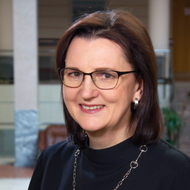New Educational Revolution: Russian and Global Online Learning Trends Discussed at eSTARS 2021

eSTARS 2021, an international online conference organized by HSE University in partnership with Coursera, has taken place for the fourth time, attracting more than 1,300 participants from about 50 countries. Participants included education administrators, academic leaders, and representatives of leading EdTech companies. The conference featured about 100 research presentations.
The first day of the conference started with a plenary session on ‘Digital Transformation: Global Challenges to the Education System’ where HSE Rector Nikita Anisimov greeted participants.
No Attachment to Campus
Nikita Anisimov emphasized that representatives of the professional community meet at this conference not only to exchange best practices in remote learning, but most importantly to hold an interdisciplinary discussion of online education as a sociocultural, philosophical and economic phenomenon.
‘During the pandemic, an era of intensified digitalization, online education has become one of the most relevant and socially focused trends of our time. It has put an end to geographic barriers, as well as time and resource limitations,’ he said.

Nikita Anisimov
HSE University aims to make high-quality academic education truly accessible; since 2013, it has included online courses in its curriculum and co-founded the National Open Education Platform. Students from various countries have chosen HSE courses over 6 million times. The university’s strategy includes a transition to digital technology in education, research, and management, while preserving the traditional advantages of a classical university.
The rector added that HSE University is actively cooperating with Coursera.
‘We are offering five master’s programmes in data science, business analysis, applied and network analysis, computer vision and finance on this platform. It has become possible to study at HSE and earn an HSE University degree from anywhere in the world, without being tied to a campus. Today, our online programmes bring together students from many countries, the best teachers, leading academics, and industry experts,’ Nikita Anisimov said.

Betty Vandenbosch
Betty Vandenbosch, Chief Content Officer at Coursera, emphasized the new requirements that employers are making of job seekers. Rapid digitalization is changing the job market landscape, and 40% of skills that employees have today won’t be relevant tomorrow. A new approach to operations will be based on integration of information technology in manufacturing, automation of business processes, and mass distribution of artificial intelligence. To overcome technological barriers, people will need relevant knowledge. In this context, universities are the locomotives of progress, aiming to train a new cohort of professionals.
According to Luciano Saso, President of the Network of Universities from the Capitals of Europe (UNICA), the educational process in the oldest European universities is rapidly moving towards digitalization: even the most conservative institutions are being forced to adjust to the new requirements of the global market. Saso believes that the academic community should reinvent how it assesses student knowledge to move from simply grinding knowledge to a complex, involved, and dialogue-based approach. Students need interdisciplinary training, competencies in different areas and a broad outlook.
‘Everything good has become visible, while everything bad is now hidden’
One of the panel discussions at eSTARS 2021 covered how online learning influences university reputation. Representatives of leading Russian universities expressed their views on the problem. According to Galina Mozhaeva, Director of Institute of Online Education of Financial University under the Government of the Russian Federation, a university’s reputation is influenced by its open educational resources, including online courses. Relevant contents, modern ergonomic design, charismatic creators, and a course’s presence on highly ranked platforms make it a tool for recruitment and promotion of university ranking.

Galina Mozhaeva
Good online courses promote not only university popularization and branding, but also commercialization of its products, Galina Mozhaeva said. She referred to the experience of Tomsk State University, which has attracted more international students with its courses on Coursera. Thanks to the courses, they were able to learn about this Siberian university. However, If a university publishes online materials that lack the required level of quality, it can have the opposite effect.
Still, low-quality resources won’t be visible online, believes Daria Kozlova, First Vice Rector of ITMO University. ‘Everything good has become visible, while everything bad is now hidden,’ she explained. Intensive and ubiquitous online learning has made all processes transparent: students from all over Russia connect to lectures by ITMO teachers on Twitch, and the mobility that universities had tried to develop before the pandemic has become more accessible thanks to the new technologies.

Daria Kozlova
Daria Kozlova emphasized that ITMO is developing online teaching not only in its graduate programmes, but in other areas as well. For example, 500,000 people work on problems on the Codeforces programming website every year and there is a joint Olympiad with VK. All these things are important for the community’s evolution; they present an opportunity to be in one space with like-minded people, which is also an important part of online learning.
Bigger Range of Programmes, Longer Periods of Learning
Another panel discussion on the first day of the conference was dedicated to trends in the online education market. Evgenia Kulik, Director for eLearning at HSE University and discussion moderator, said that over the last 3-5 years, not only have content delivery technologies developed rapidly, but so have markets in terms of business models, product formats, monetization models, etc. She said that the growing demand for education in developing markets is related to the growing population, while in developed markets it has to do with the technological advancement.

Evgenia Kulik
Forecasts by analytical agencies show that the online education market will double by 2025 (today, its share is several percent), while the market for micro-degrees, which totals about $20 billion today, will grow six times over this period, said Evgenia Kulik.
Representatives of Russia’s leading EdTech companies talked about their experiences of implementing online learning. Dmitry Krutov, founder and CEO of Skillbox, said that judging by growth rates, today’s leaders are programmes that teach interior designers, pastry chefs, florists, etc, and more and more professions and fields are becoming digitalized. Many people are interested in learning IT development, because they believe that they can earn a lot of money in IT, but they later realize that other professions are more interesting to them, so they choose these and achieve success. Sometimes, students attend courses not for careers and salaries, but to learn something as part of their hobby.

Dmitry Krutov
Marianna Snigireva, CEO of Netology, believes that demand for long-term programmes is an EdTech trend. A Netology course used to last two months, but then it grew to six; today, 12 or 18 months are most common: people are ready for long learning and understand that becoming qualified in a profession is difficult. The longer the programme, the fewer people complete it, the expert said. To complete one’s studies requires a high level of motivation. In these terms, new educational platforms are now similar to universities.

Marianna Snigireva
Another trend in online education is the change of format, Marianna Snigireva said. Netology started with webinars, in which offline methods simply moved online: lectors talked before the audience, assigned them homework, etc. At first, it was fine, but today, this is not enough. Online learning offers a lot of alternative tools and opportunities, including simulators and quizzes. In adult learning, this is particularly important since adults aren’t in the habit of studying; their everyday lives do not accommodate learning, and it’s essential to look for formats that can facilitate the study process for them.
Online Learning as the Basic Minimum
The second day of the conference started with a panel discussion on ‘Disruption and the Changing Nature of Online Education,’ which moderated by William Kuskin, Associate Dean for Digital Education at the University of Colorado Boulder. He said that the discussion participants—Jeff Maggioncalda, CEO of Coursera; Yaroslav Kuzminov, Academic Supervisor at HSE University; and Vladimir Mau, Rector of the Russian Presidential Academy of National Economy and Public Administration—are visionaries. He proposed that they reflect on the future of universities and take into account online technologies.

Jeff Maggioncalda
Jeff Maggioncalda said that although online technologies in education had developed before, which is confirmed by Coursera experience, during the pandemic people started adapting to technology changes faster. University and college teachers have started using the new opportunities, while businesses have begun doing the same for staff training. Mr Maggioncalda believes that the experience of the last 18 months means not only experiments at universities, but a new format for classes, which will remain forever. It will continue to improve thanks to cooperation between universities and technology companies.
‘We are entering a period of new normality in education, when online learning is becoming not an innovation and not a new technology that adds to the old one or breaks the old one,’ Yaroslav Kuzminov said. ‘Online learning is becoming a basic minimum, which will be complemented by advanced elements related to online communication. A new educational revolution will involve not only universities, but also schools. In secondary education, however, the online component will be much smaller. Still, simulators, services, AI and feedback systems will be used at schools wider than at universities.’

Yaroslav Kuzminov
Mr. Kuzminov believes the idea of the new educational revolution is that technology development together with big data forecasting capabilities helps personalize online learning. Since John Amos Comenius, founder of the class-lesson system, the key problem of education has been providing feedback en masse, which is particularly important for those who have a hard time mastering the curriculum. Digital technologies help make this communication considerably more reliable and sustainable, but this is a matter of the future. We are only at the beginning of change and are still merely reproducing many classical forms of education in remote format.

Vladimir Mau
Vladimir Mau said a fundamental shift in education as compared to the 19th-20th centuries is the transition from a focus on products to a focus on humans. Traditionally, a focus on people has been limited to the opportunity to choose individual learning trajectories: universities have been proud to offer a lot of optional courses. Today, it will be possible to form individual trajectories with recommendations made largely by AI, while students’ responsibility for their choice will grow.
Vladimir Mau believes that online education should not be analysed solely in terms of technology: it also involves problems of social adaptation, readiness to accept the technologies, and the ability to use them for good rather than harm.
‘We should see remote learning opportunities and understand that it is only up to us, education administrators, and to those who study whether it will lead to improvement or degradation. No one guarantees happiness for everyone,’ Mr. Mau concluded.
See also:
‘We Are Witnessing an Educational Revolution That Goes Beyond Universities’
Higher education has special value in the dynamically changing world of highly competitive labour markets. Employers care not only about diplomas, but also about the quality and relevance of the knowledge and skills gained from university. Online learning has become ‘the new normal’ in education—a minimum prerequisite. These issues were discussed by experts during the eLearning Stakeholders and Researchers Summit (eSTARS 2021) organised by HSE University in cooperation with Coursera.
Development Trends in Online Education Market Discussed at eSTARS 2021 Conference
The leaders of Russian and global EdTech companies met to discuss industry evolution, explain why demand for non-digital professions on platforms keeps growing, and speak about building online learning with a human touch. A panel discussion on ‘Trends in the Development of the Online Education Market’ was held as part of the eSTARS 2021 international conference organized by HSE University and Coursera.
Seven Days Until eSTARS 2021 International Academic Conference
On December 1st and 2nd, 2021, the eLearning Stakeholders and Researchers Summit (eSTARS 2021), an international online conference organized by HSE University in partnership with Coursera, will take place. eSTARS will discuss pressing issues facing universities today in the context of the growing interdependence of digital technology, the economy and education.
Applications to Speak at eSTARS 2021 Conference Accepted Until November 15
HSE University and Coursera are bringing together the world’s leading researchers, professionals, education and technology leaders, and business community representatives for the fourth international research conference eLearning Stakeholders and Researchers Summit 2021 (eSTARS). This topic of this year’s summit, which will run from December 1–2, 2021,is ‘Digital Transformation: Global Challenges to the Education System’.


